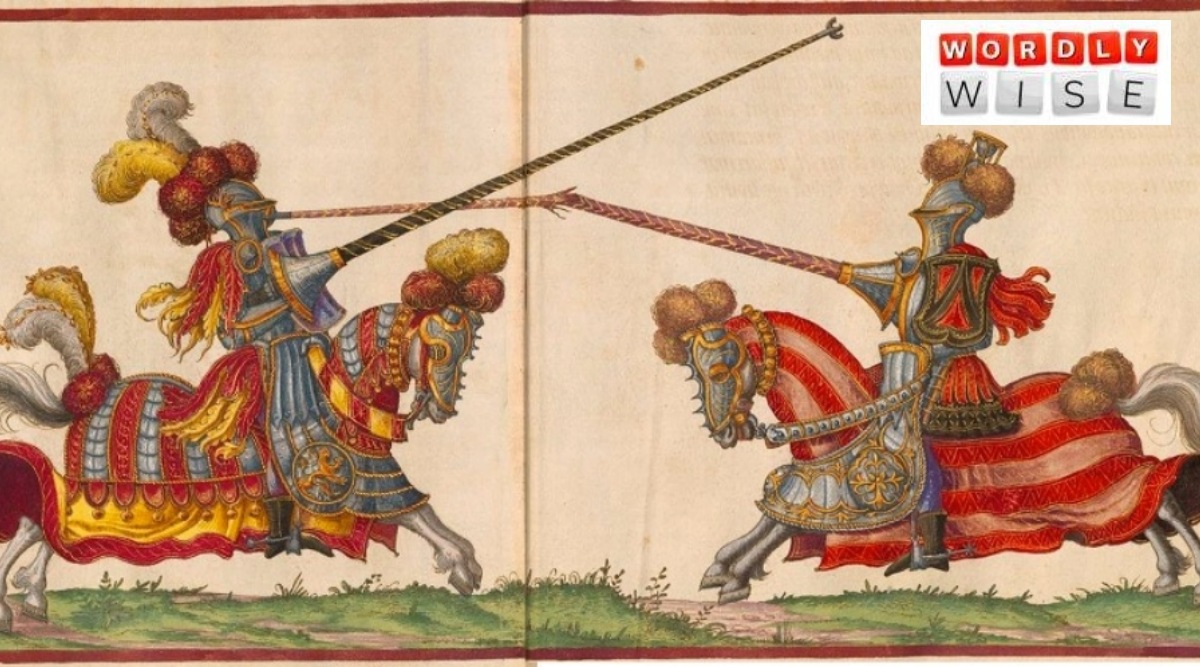Wordly Wise | Jamming with some J-words
Junta, jocund, jalopy: the provocation this week is the letter ‘J’. Let’s have some fun as we go on our weekly word hunting adventure.
 "High" jousting in Europe in the Middle Ages. (Wikimedia Commons)
"High" jousting in Europe in the Middle Ages. (Wikimedia Commons) This past week, I stumbed upon many a word starting with the letter ‘J’. From July, the month which drew to a close and which climate researchers declared to be the hottest ever recorded, to junta, in context of the recent coup d’etat in the West African country of Niger.
And as luck would have it, I also happened to stumble upon a very old edition of Reader’s Digest, a relic of my college days, which brought me face to face with some lovely words, all starting with ‘J’, in its ‘It Pays to Enrich Your Word Power’ section.
So for this week’s Wordly Wise, ‘J’ was the obvious choice. Here is an assortment of words from the Reader’s Digest list, and a few that I have added from my side. Let’s jam with some ‘J’ words.
Junta is Spanish-origin word meaning committee or council. In modern usage, it means a group of military officials controlling power by armed force, without electoral sanction. It was first borrowed into English in the early 17th century and in Britain has long been regarded as a fully naturalized word. In America, the word has been in effect re-borrowed from the Spanish of the Americas and, therefore, with the pronunciation you would more likely hear is ‘hoon-ta’. In England and elsewhere, it would be ‘jun-ta’. Words cabal and clique come close to its meaning.
Junto, an English variant of junta but less commonly used, means either a small political faction or a secret society that works clandestinely.
Jingoism is a word with an interesting history. ‘By jingo’ was originally a conjurer’s expression which entered common English speech to show strong affirmation. It became famous through a popular song of 1878, the year in which British Prime Minister Benjamin Disraeli sent a fleet into Turkish waters to counter the Russians. His strong nationalistic policy was supported in the lines of the song: We don’t want to fight, but by jingo if we do; we’ve got the ships, we’ve got the men, we’ve got the money too.
Today, the word refers to intense – bordering on irrational – patriotism, favouring an aggressive, warlike foreign policy. A leader who stands for such an approach is a jingoist.
Jeremiah was a biblical Hebrew prophet who lived in 7th-6th centuries BC. He wrote a book in which he literally cried for Jerusalem and Zion which were devastated by the Babylonians. In modern English usage, therefore, a jeremiad is a recurring lament and often a bitter denunciation and complaint.
The word jejune has a wide range of meanings. It could stand for barren, empty, dull, flat, inane, vapid, and therefore, by extension, uninteresting, childish, immature, puerile or juvenile. It comes from Latin jejunus, meaning fasting, and jejunum, a part of the small intestine that is empty after death. For example, “It was a jejune plot for a movie.”
A crisp and crunchy word is joust, meaning a personal combat, which originally happened in the Middle Ages between knights on horseback wielding lances. In modern usage, it is mostly used figuratively. For instance: “The two best teams jousted (verb) for the first spot;” or, “I sat through the courtroom joust (noun) between two brilliant lawyers.”
Used as an adjective, jocund means pleasing, joyful or marked by mirthfulness. It comes from Latin jucundus, meaning delightful, agreeable and ultimately from the Latin verb juvare, meaning to help. “It was such a jocund company! I enjoyed the trip thoroughly.”
Matching it is another word, jocular, which means joking, merry, humorous. “His jocular uncle kept us all in splits.”
Jalopy refers to an old dilapidated car or aircraft. The word first appeared in the 1920s but its origin is obscure. Perhaps it came from the Mexican town of Jalapa where used cars from the United States, which was witnessing an automobile boom, were sent. These used and battered cars, jalapas, would be repaired and sold in the Mexican market. In English, they became jalopies.
- 01
- 02
- 03
- 04
- 05






































